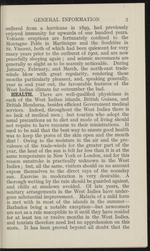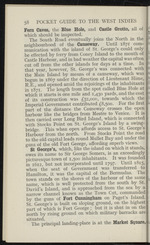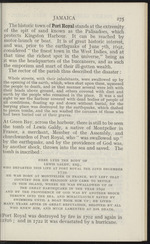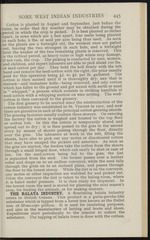| 1 |
 |
“...outnumber the bad.
HEALTH. There are well-qualified physicians in
each of the West Indian islands, British Guiana, and
British Honduras, besides efficient Government medical
services. Indeed, throughout the West Indies there is
no lack of medical men; but tourists who adopt the
usual precautions as to diet and mode of living should
not require to have recourse to their ministrations. It
used to be said that the best way to ensure good health
was to keep the pores of the skin open and the mouth
shut! Owing to the moisture in the air and the pre-
valence of the trade-winds for the greater part of the
year, the heat of the sun is felt far less than it is at the
same temperature in New York or London, and for this
reason sunstroke is practically unknown in the West
Indies ; but, all the same, visitors should on no account
expose themselves to the direct rays of the noonday
sun. Exercise in moderation is very desirable. A
thorough wetting by the rain should be guarded against,
and chills at sundown...”
|
|
| 2 |
 |
“... but not incorporated until 1797. Until 1815,
when the seat of Government was transferred to
Hamilton, it was the capital of the Bermudas. The (
town stands on the shores of the harbour of the same L
name, which is well protected from the south by St.
David’s Island, and is approached from the sea by a
narrow channel known as the Town Cut, commanded
by the guns of Fort Cunningham on Paget’s Island.
St George’s is built on sloping ground, on the highest
part of which is Fort George ; but it is shut in on the
north by rising ground on which military barracks are
S* The principal landing-place is at the Market Square,...”
|
|
| 3 |
 |
“...It can be reached by
motor-launch or boat. It is of great historic interest,
and was, prior to the earthquake of June 7th, 1692,
.considered “ the finest town in the West Indies, and at
that time the richest spot in the universe,” being as
it was the headquarters of the buccaneers, and as such
the emporium and mart of their ill-gotten wealth.
The rector of the parish thus described the disaster:
h Whole streets, with their inhabitants, were swallowed up by
the opening of the earth, which, when shut upon them, squeezed
the people to death, and in that manner several were left with
their heads above ground, and others covered with dust and
earth by the people who remained in the place. It was a sad
sight to see the harbour covered with dead bodies of people of
all conditions, floating up and down without burial, for the
burying place was destroyed by the earthquake, which Hi.«hod
to pieces tombs, and the sea washed the carcases of those who
had been buried out of their graves.
At Green Bay...”
|
|
| 4 |
 |
“...floor
or cotton loft. In this the cotton is temporarily stored and
spread out to dry; it is then passed to the gins in the second
! story by means of shoots passing through the floor, directly
over the gins. The labourers at work in the loft, filling the
i shoots, have also to pick out any motes or discoloured cotton
I that may have escaped the pickers and assorters. As soon as
the gins are started, the feeders take the cotton from the shoots
1 through a small hinged door, which can easily he shut in case of
fire. On the seed-cotton being fed to the gins, the lint
is separated from the seed. The former passes over a leather
: roller and drops on to an endless conveyor, while the seed falls
through the grids on to an inclined plane, and passes through
the floor to the lowest storey. While the lint is on the conveyor,
any motes or other impurities are watched for and picked out.
From the conveyor the lint is taken to the baling-room, where
it is baled under pressure. It is then ready for...”
|
|
